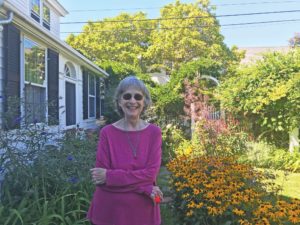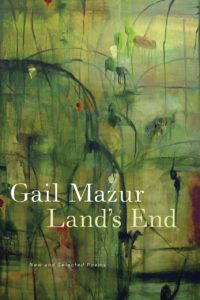“I knew it was going to make a person uncomfortable the minute they heard I was a poet,” Gail Mazur says. “I was really quite modest in my ambitions. I didn’t say more than I was a writer, until I found the Grolier Poetry Book Shop. It was like I’d been hit over the head with something wonderful. It changed my life.” She laughs, her voice that of the woman she was in her 20s, living in bustling Cambridge in the 1960s on the cusp of self-discovery. When Grolier’s owner died, Mazur founded the Blacksmith House Poetry Series of readings, which continues to this day.

Now in her early 80s and a central figure of the Outer Cape poetry community, Mazur awaits the publication of Land’s End: New and Selected Poems on Sept. 11, her seventh book. Many of the poems are set in Provincetown, connecting with one another like a string of pearls.
In the 1980s, she and artist Michael Mazur, her husband, were dipping their toes in Provincetown, with off-season visits graduating to seasonal stays. “We fell in love with Provincetown in the winter, and this is still the way I think of the town — the year-rounders, the quiet seasons,” she says.
Walking along the bay remains a source of solace and transformation for Mazur. “On the flats two gymnasts/ in mirroring postures, sculptural,/ invulnerable./ The tide out this little moment./ Old wooden houses inherited for generations,/ additions jerry-built over the past century/ from spit and salvage./ The old order: how sturdy they look—/ yet fragile—/ dilapidated homes with names/ hand-painted, repainted/ above the doors by children, grandchildren/ Harmony Sea Barn Snug Harbor,” Mazur writes in “Early Morning Walks.”
Mazur is often asked about her use of the commonplace as a pathway into deeper meditation. “I think the ordinary has endless riches, and changes every day,” she says.
Initially, the Mazurs rented a cottage on Miller Hill Road from Jean Bultman, wife of Fritz Bultman, a painter who knew Hans Hofmann in Bavaria. Mazur had published her first book of poems, Nightfire, and was invited to join the Fine Arts Work Center poetry committee in winnowing a thick stack of applicants to the four poets who would join the incoming group of fellows.
It was a poet’s golden age. Literary titan Stanley Kunitz, FAWC founder, was on one side of the table, Alan Dugan on the other. Situated between the gregarious Kunitz and reclusive Dugan, Mazur had found her tribe. “I loved being in the company of people who wrote poetry,” she says, speaking from her Commercial Street home, an expanded two-room fishing shack that the couple bought 30 years ago. “That a community of poets existed was so encouraging to me.”
In the poem “At Land’s End,” Mazur tends flowers linking to her elders: “This garden, its descendants of Stanley’s anemones,/ flowing, pearlescent — like the nacre of shells,/ their offspring mine now, in my yard, fragile/ beside the orange blare of Dugan’s trumpet vine/… Oh Stanley, tending your cultivated dune/ under the sun of justice, wiry, undefeated, feeding/ your annual seedlings….”
Mazur was an undergraduate at Smith College when a classmate, the daughter of a local framer, asked her to dinner. “And Mike, on leave from Amherst College to study printmaking at Smith, was there,” Mazur says. “We were together after that.” Michael Mazur got a teaching job at the Rhode Island School of Design, and when he was awarded a Guggenheim Fellowship, the couple relocated to Cambridge.
Michael became an instructor at the Fine Arts Work Center and founded FAWC’s New Provincetown Print Project; his slide presentations began with a series of lithographs and etchings of life in a locked ward at a Rhode Island mental hospital. “He was very political, and an idealist,” Mazur says of her husband. Their shared passion for art and activism is threaded through her life and work. In “There Came a Time,” she writes, “Those October hours, I read to you from Rilke’s Letters/ to Clara, … your eyes on my lips/ as my eyes had fixed on your lips from the beginning,/ and on your blue eyes, your face turned next to mine.”

At this fall’s Blacksmith Series virtual opening, Mazur will read from Land’s End, as part of a conversation with Major Jackson. She and Jackson forged a friendship when he was a FAWC fellow, and as editor of The Best American Poetry 2019, Jackson included Mazur’s poem “At Land’s End.”
“There is a grief that is absorbed,” Mazur says. “Mike died 11 years ago, and he is still in the forefront of whatever else there is.” Mazur turns to the theme of grief mingled with love of Provincetown in these lines, from “End of Summer”: “Soon all but the gulls would leave, their season here over, and I, too, would leave./ When I walked back to the shore over tide-strewn pebbles and the jagged/ shells of oysters and scallops and crabs, my feet had become a child’s feet again,/ uncomplaining, pliant./ Time had gone by, but in those moments, there was no pain. I recalled nothing/ of grief or fear or despair./ Grief, fear, despair — as if I were sleepwalking, those were not the elements of/ that August afternoon.”
In Land’s End, Mazur has done the hard work, building a palette of primal elements, the metaphors of place — gulls, sand, pebbles worn by tides — to express the yearnings of mortality.



